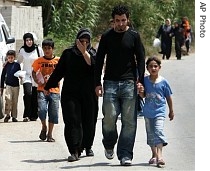2007年VOA标准英语-Thousands Flee Lebanon Camp as Fragile Truce Ho(在线收听)
Cairo
23 May 2007
Palestinian civilians from a besieged refugee camp in north Lebanon have been fleeing in vast numbers since a shaky ceasefire took hold late Tuesday. VOA Correspondent Challiss McDonough has more from our Middle East bureau in Cairo.
 |
| Palestinians flee from Nahr el-Bared refugee camp, in northern city of Tripoli, Lebanon, 23 May 2007 |
Roughly half the camp's residents crammed into cars and minivans, others walking to safety on foot. Most are headed for another refugee camp known as Badawi, a few kilometers away.
The United Nations and the Red Cross have shifted their attention from trying to get aid into the besieged camp to trying to help people who are escaping the violence.
Hoda Samra is a spokeswoman for UNRWA, the U.N. agency responsible for the humanitarian needs of Palestinian refugees. She said the agency has been opening its schools and other buildings to provide temporary housing.
"We will have big, big challenges to address in terms of humanitarian assistance to the displaced, now that they have moved out of the camp and taken refuge in other camps, particularly Badawi," she said. "We as UNRWA will have to feed those refugees, we will have to provide them with accommodation, that is now our schools. And we hope this situation does not last and we get assistance so that we can help in turn those refugees."
She said the agency has no firm count of the number of displaced, or the number of civilian casualties.
Television footage and photographs taken inside Nahr al-Bared show extensive damage to residential buildings.
Analysts say it is unclear whether the army will storm the camp, which has been off-limits to Lebanese authorities since 1969. The deputy leader of Fatah al-Islam told the Associated Press that the army would only enter the camp, in his words, over our dead bodies.
The group has denied Lebanese government allegations that Syria is behind its actions, and the Syrian government has denied that as well.
Members of Lebanon's ruling coalition, which is composed of mainly Sunni Muslim, Christian and Druze factions, have denied media reports - most notably in the New Yorker magazine - that they actually funded and supplied Fatah al-Islam before this outbreak of fighting, in an effort to counterbalance the influence of the armed Shiite group Hezbollah.
Fatah al-Islam has also been accused of ties to al-Qaida, although it is not clear whether they extend beyond ideological inspiration. The group's leader, Shakir al-Abssi, was convicted in absentia and sentenced to death in Jordan last year for the 2002 murder of a U.S. diplomat. Jordanian-born al-Qaida in Iraq militant Abu Musab al-Zarqawi was also convicted for the same crime.
Al-Abssi was released from a Syrian prison last year.